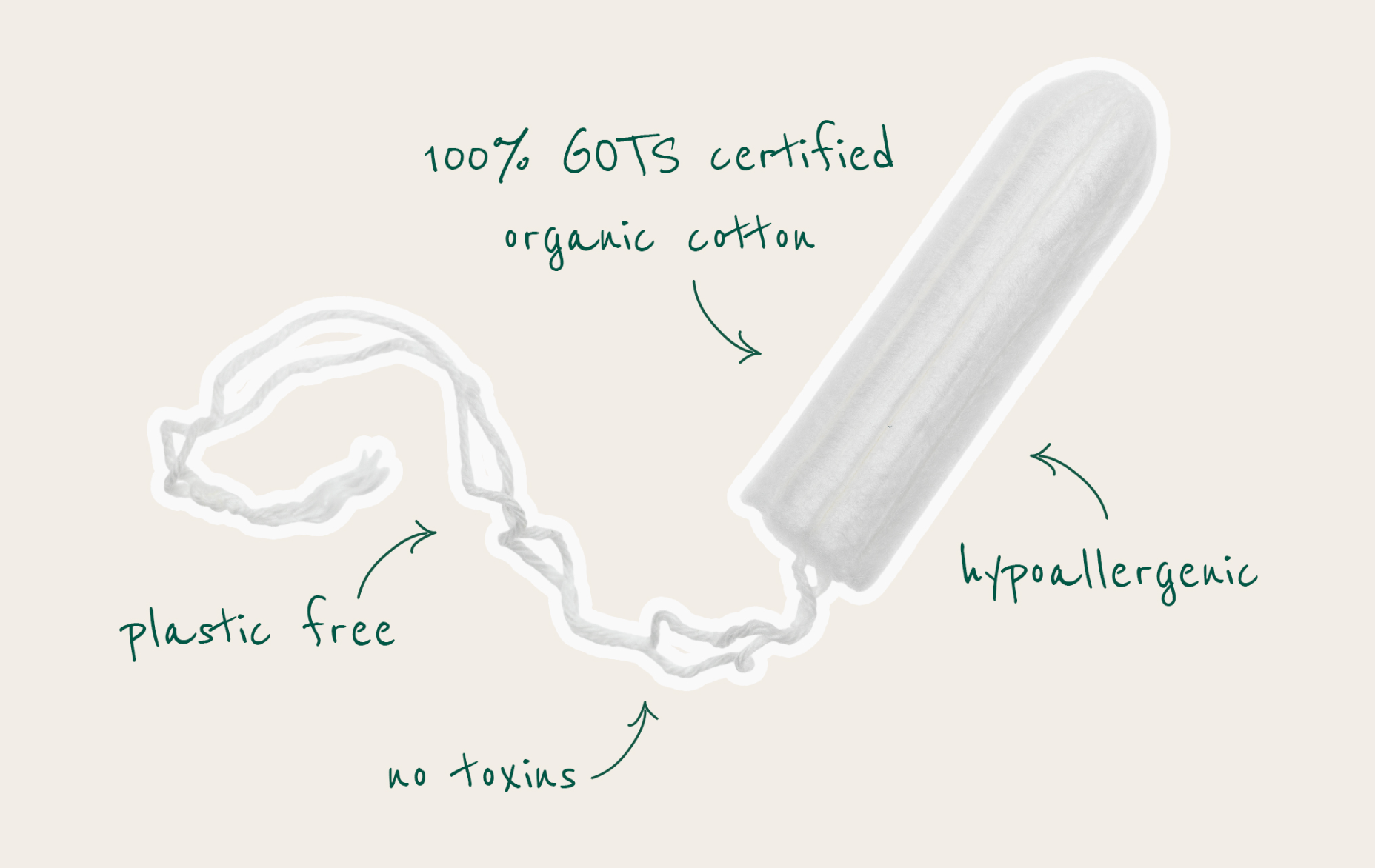Have you ever found yourself wondering, "What exactly is in my tampon?" You're not alone! As something we use so intimately, it's important to know what tampons are made of and how these materials can impact our bodies.
In this article, we'll unpack the ingredients found in traditional tampons vs our tampons and introduce you to a game-changing alternative: organic cotton tampons.
The lowdown on conventional tampons
So, what is the main ingredient in most tampons? The answer is rayon, a semi-synthetic fibre derived from wood pulp. While rayon is incredibly absorbent (a must for period products), the process of turning wood pulp into rayon often involves some not-so-friendly chemicals like carbon disulphide and sulphuric acid.

But wait, there's more. Traditional tampons may also contain cotton or a blend of rayon and cotton. And while cotton is a natural fibre, it's often grown using pesticides and bleached with chlorine during processing. Not exactly what you want near your most sensitive areas, right?
Let's talk about the string
You know that little string that dangles from your tampon? It may seem like an afterthought, but it plays a pretty important role in your period experience. Typically made from cotton or a cotton-polyester blend, the string is there to help you remove your tampon easily and safely.
But have you ever wondered if the string itself could be harbouring any nasties? In conventional tampons, the string may be treated with the same chemicals used to process the tampon itself, like bleach or dyes. This can lead to irritation or even allergic reactions in some people.
Chemicals in traditional tampons
Brace yourself, because conventional tampons can be packed with various chemicals that may cause irritation or allergic reactions. We're talking about things like:
- Dioxins: Byproducts of the bleaching process used on rayon and cotton.
- Pesticide residues: From non-organic cotton farming.
- Fragrances: Added to scented tampons, which can throw off the delicate pH balance of your vagina.

Exposure to these chemicals has been linked to some serious health concerns…
How these chemicals can impact your body
So, what exactly can these chemicals do to your body? Let's break it down:
- Dioxins: These persistent organic pollutants can accumulate in your body over time and have been linked to hormonal changes, immune system suppression, and even cancer.
- Pesticide residues: Exposure to pesticides has been associated with hormonal imbalances, fertility issues, and an increased risk of certain cancers.
- Fragrances: While they may make your tampon smell nice, these added fragrances can disrupt the delicate pH balance of your vagina, leading to irritation, itching, and even infections like bacterial vaginosis or yeast infections.
But that's not all – the cumulative effect of these chemicals can take a serious toll on your reproductive health. Studies have shown that exposure to endocrine-disrupting chemicals (like those found in conventional tampons) can lead to a host of issues, including:
- Difficulty conceiving
- Increased risk of miscarriage
- Hormonal imbalances
- Painful periods
- Endometriosis
- Polycystic ovary syndrome (PCOS)
The DAME difference: 100% organic cotton tampons
At DAME, we believe you deserve better. That's why our tampons are made with 100% certified organic cotton and absolutely nothing else. No toxins, no bleach, no synthetic materials – just pure, natural goodness.
Our organic cotton is grown without harmful pesticides and processed without chlorine bleaching, resulting in a hypoallergenic product that's gentle on even the most sensitive skin. Plus, by steering clear of those harsh chemicals, our tampons help maintain the natural pH balance of your vagina.
Breaking down biodegradability
Another pioneering aspect of DAME's organic cotton tampons? They're fully biodegradable. Unlike conventional tampons that may contain plastic elements, ours can completely decompose in compost bins. Even our wrappers are made from plant-based cellulose, ensuring that every part of the product is biodegradable.
By choosing sustainable period products like DAME's organic cotton tampons, you're not only taking care of your body but also helping to reduce the environmental impact of menstrual waste. It's a win-win!
Knowledge is power
Now that you know what tampons are made of, you can make informed decisions about your menstrual health. By choosing organic cotton tampons from DAME, you're prioritising your well-being and minimising your exposure to potentially harmful chemicals.
Still unsure about making the switch? Check out our blog post on the benefits of switching to organic tampons to learn more.
Remember, your period care choices matter – for your body and the planet. So go ahead, make the switch to DAME's organic cotton tampons and experience the difference for yourself! Don't forget to pair them with our reusable applicator for an even more eco-friendly period.



